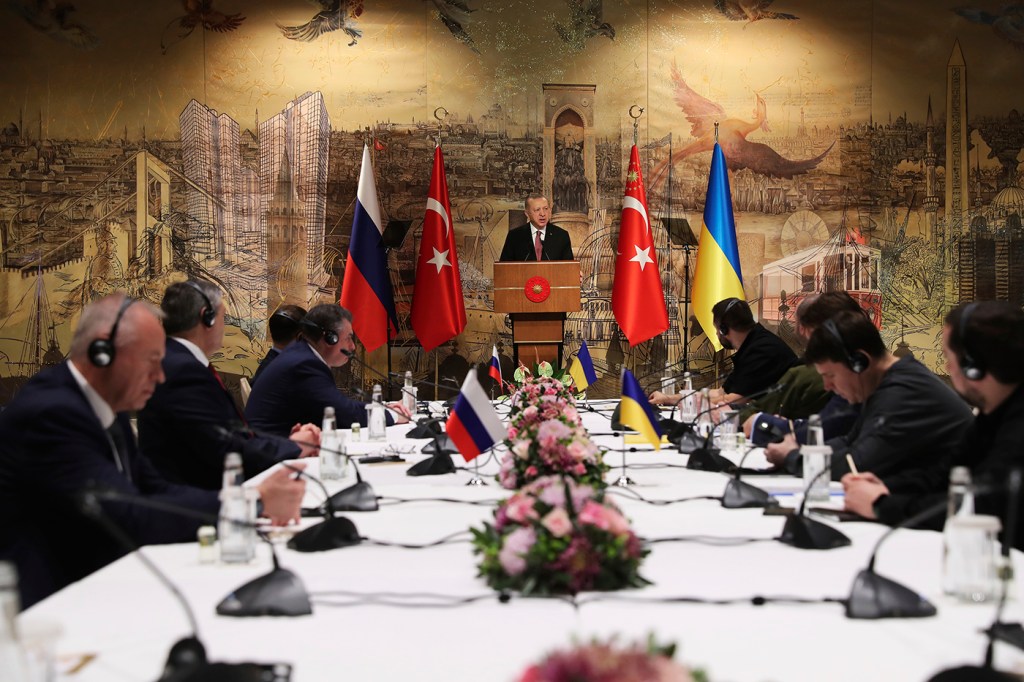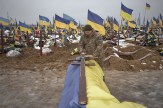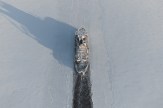Why Biden’s call for Putin’s ouster isn’t damaging the Ukraine negotiations

This report is part of ongoing coverage of the Russia-Ukraine war. Visit our dedicated page for more on this topic.
President Joe Biden has refused to back down from a bold statement he made Saturday in Warsaw at the end of a speech on the Ukraine war. “For God’s sake, this man cannot remain in power,” Biden said of Russian President Vladimir Putin.

Biden insisted Monday that his comment “expressing my outrage” isn’t signaling a change in U.S. policy. “It doesn’t mean we have a fundamental policy to do anything to take Putin down in any way,” he said.
Biden’s ad lib is less important than the Ukraine-Russia negotiations that have been developing in Istanbul, says Mai’a Cross, the Edward W. Brooke Professor of Political Science and International Affairs at Northeastern.
“The comment was what everybody has been thinking,” Cross says. “The Western alliances have all but said that a lot of the turmoil and unnecessary bloodshed could end if Putin stepped down or was overthrown in some way.”
Cross spoke with News@Northeastern about Biden’s statement, the ongoing negotiations, and the impact of Western sanctions on Russia. Her comments have been edited for brevity and clarity.
What did you make of the reaction to Biden’s statement?
Some of it is actually coming from European leaders who say that Biden’s comment serves to escalate tensions.
I don’t think it does, because everything else Biden has conveyed through diplomacy and actions has been to avoid escalation—to avoid a situation that could grow into World War III. He has very clearly avoided direct threats to Russia, and even NATO’s posturing in recent weeks has avoided a direct threat to Russia.
He said the unspoken thing that many of us have been thinking, and ultimately it’s not enough to truly escalate anything.
How do you gauge the ongoing diplomatic efforts?
We can at least observe some standard diplomatic protocol being followed at the moment, of agreeing on a neutral location, having a seemingly neutral mediator, and clearly seeing agreement on what sorts of measures are going to be released to the public sphere and debated openly versus other aspects of the negotiations that are happening privately.
But at the same time, it is diplomacy conducted under the barrel of a gun. Because the war is ongoing.
So there’s really a question of whether whatever the Russian delegation puts forward can actually be trusted, or whether this is just one of those distractions to pretend that diplomacy is a possibility while continuing to focus on the battlefield.
Are you seeing concessions in the negotiations?
The biggest development is the announcement by [Ukrainian President Volodymyr] Zelenskyy of his willingness to embrace the neutrality of Ukraine going forward if the Russian troops first withdraw from the country. That is very surprising to me. It’s an about-face because it is specifically the area in which Zelenskyy said that Russia could not exert control over Ukraine.
Is this an example of Zelenskyy negotiating in a practical way? He’s willing to abandon his efforts to join NATO while actively seeking to become part of the European Union. But if no EU invitation is forthcoming, then he has little choice but to negotiate with Russia on Putin’s terms.
To some degree, he feels a bit on his own. We know that the West has pulled together for an unprecedented sanctions regime against Russia and an unprecedented flow of weaponry into Ukraine to support the military effort.
But Zelenskyy has asked time and time again for the West to be open about its membership prospects in NATO and the EU. As an EU expert, I think the EU should move faster and offer candidacy to Ukraine. It’s a complex process, but it’s not ultimately a big burden for the EU to allow Ukraine to become an official candidate—not a member, but a candidate—so that it begins the process of conforming to EU law. That would send a clear signal to Ukraine that ‘we’re openly saying that your future is in the EU and we’re willing to start working with you to achieve that.’
In not having been offered some timeline to EU membership, he is being pragmatic and trying to figure out a way to save Ukrainian lives and Ukrainian cities.
What do you make of Russia’s willingness to negotiate less than five weeks into the war?
Well, Putin himself hasn’t been willing to personally step forward and conduct these negotiations. So I look at it with a lot of skepticism. After all, Russians were also in negotiations with Ukraine while orchestrating the beginning phases of the invasion.
But it is a fact that after the announcement of Ukrainian neutrality as a possibility, Putin started to withdraw troops from the outskirts of Kyiv. That does show that the Russian military is exhausted, it is out of resources, it’s backing down, it has not been able to achieve its key goals. So maybe this is something that is starting to be taken seriously because there are clear ways in which Russia can claim some on-the-ground wins in terms of Donbas and the land bridge to Crimea, and then politically in terms of gaining Ukrainian neutrality.
How damaging have the sanctions been on Russia?
Extremely damaging. They are something that the Russian economy cannot sustain over the long term.
If it were to withdraw troops from Ukraine, it could negotiate a rolling back of some of these sanctions, with the idea that if the invasion goes forward again, then sanctions would immediately be put back into place.
Before the invasion, there was much talk that if Putin were not stopped in Ukraine then he would attack other countries in the region. Has the ineffectiveness of this invasion reduced the fear that the region has long held for Putin?
There’s still a lot of fear. Putin has behaved in quite an unpredictable way. He has put his nuclear forces on a high-alert standing. He has threatened, and has a track record of using, chemical weapons. He has the hypersonic missile and other technology that could be quite damaging.
The conventional attack of using troops on the ground is a very difficult one for him to carry off, especially in this day and age with the benefit of satellites and intelligence. But the more destructive missile strikes and the potential use of tactical nuclear weapons are still in his arsenal. In fact, he has more tactical nuclear weapons than the U.S.
A study done a year ago at Princeton by a group of high-level security and military experts laid out precisely how the use of one tactical nuclear weapon on the part of Russia could quickly grow into a world nuclear war, with 90 million casualties within hours.
At this point, though, it’s unlikely that we would see a spreading of the war beyond Ukraine, the threat exists as long as Russia is the kind of actor that it is today.
For media inquiries, please contact Marirose Sartoretto at m.sartoretto@northeastern.edu or 617-373-5718.






